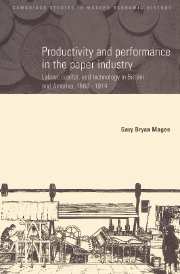 Productivity and Performance in the Paper Industry
Productivity and Performance in the Paper Industry Book contents
- Frontmatter
- Contents
- List of figures
- List of tables
- Acknowledgements
- List of abbreviations
- Introduction
- 1 Background
- 2 Technological change
- 3 Performance
- 4 Rags, esparto, and wood: entrepreneurship and the choice of raw materials
- 5 The Anglo-American labour productivity gap
- 6 Unions and manning practices in Britain and America
- 7 Raw materials, women, and labour-saving machinery: the Anglo-American gap, 1860–1890
- 8 Technological divergence: the Anglo-American gap, 1890–1913
- 9 Free trade and paper
- Conclusion
- Bibliography
- Index
9 - Free trade and paper
Published online by Cambridge University Press: 16 March 2010
- Frontmatter
- Contents
- List of figures
- List of tables
- Acknowledgements
- List of abbreviations
- Introduction
- 1 Background
- 2 Technological change
- 3 Performance
- 4 Rags, esparto, and wood: entrepreneurship and the choice of raw materials
- 5 The Anglo-American labour productivity gap
- 6 Unions and manning practices in Britain and America
- 7 Raw materials, women, and labour-saving machinery: the Anglo-American gap, 1860–1890
- 8 Technological divergence: the Anglo-American gap, 1890–1913
- 9 Free trade and paper
- Conclusion
- Bibliography
- Index
Summary
Although in terms of productivity levels the United States led the world throughout the latter half of the nineteenth century, as an exporter of paper America was to have little impact on world markets until the very end of the century. To a large extent this was due to the size of America's domestic market and high transportation costs, which together diminished the need for, and ability of, Americans to export. In terms of direct competition in the marketplace then, Britain's main rival in this period was Germany, not America. It was a rivalry that extended to both Britain's external, as well as internal paper markets, and which was often tinged with antagonism. Of course, Germany was no marginal producer of paper. After America it was the largest paper producing country in the world, and in 1913 its share of world paper and board production stood at around 20 per cent.
The success of German and other continental paper manufacturers in their own home market was a constant and worrying feature of the British papermaker's experience after 1861. To many observers such success represented an indictment of Britain's commercial policies, which gave foreigners free access to the British home market without in turn securing similar admission to foreign markets for its own producers. In particular, Germany evoked vehement criticism in Britain for its unwillingness to play cricket in the matter of fair trade; though, of course, Germany was by no means the only country in the latter half of the nineteenth century to be censured by British public opinion for its abrogation of the British sense of fair play.
- Type
- Chapter
- Information
- Productivity and Performance in the Paper IndustryLabour, Capital and Technology in Britain and America, 1860–1914, pp. 240 - 266Publisher: Cambridge University PressPrint publication year: 1997


